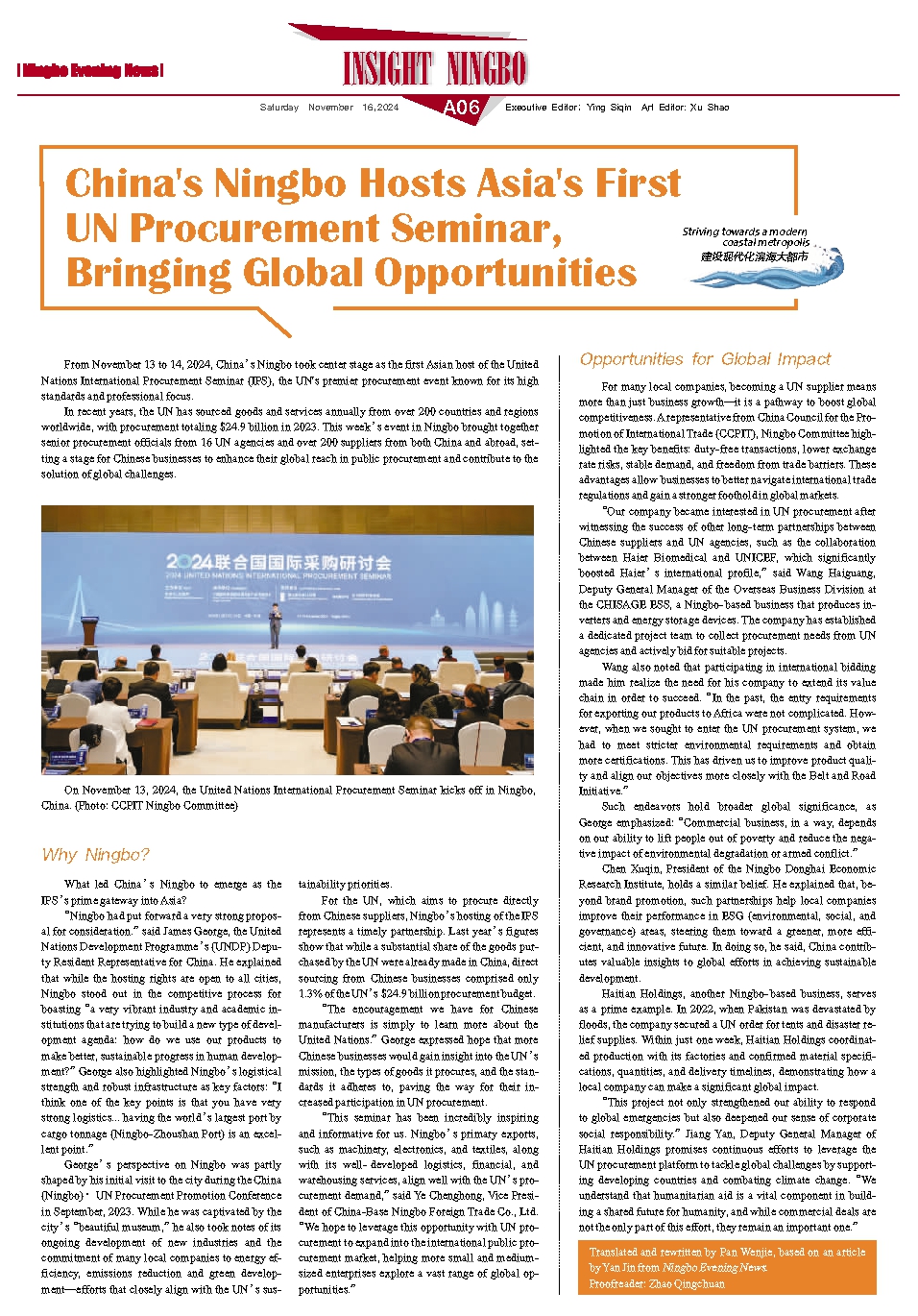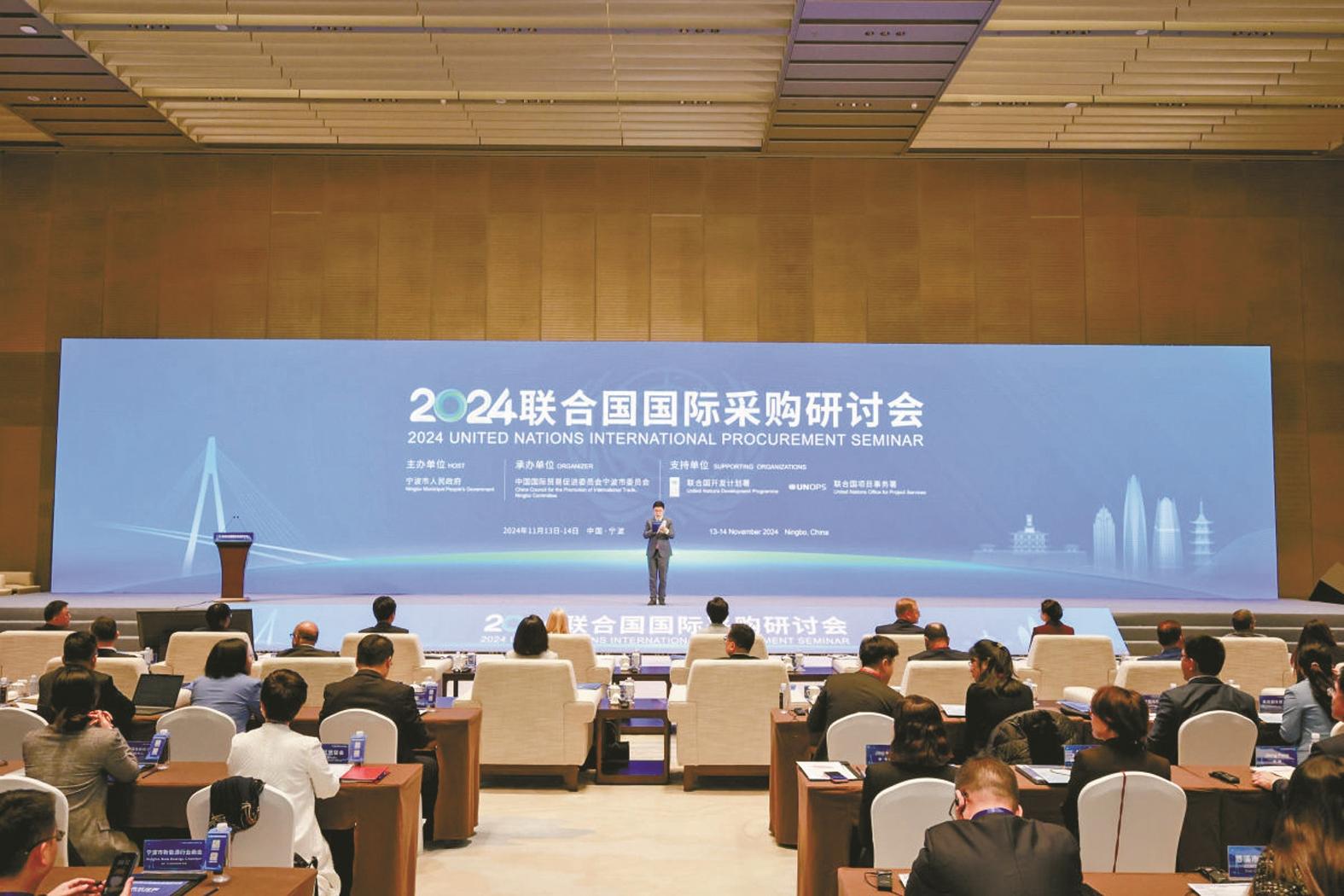From November 13 to 14, 2024, China’s Ningbo took center stage as the first Asian host of the United Nations International Procurement Seminar (IPS), the UN's premier procurement event known for its high standards and professional focus.
In recent years, the UN has sourced goods and services annually from over 200 countries and regions worldwide, with procurement totaling $24.9 billion in 2023. This week’s event in Ningbo brought together senior procurement officials from 16 UN agencies and over 200 suppliers from both China and abroad, setting a stage for Chinese businesses to enhance their global reach in public procurement and contribute to the solution of global challenges.
Why Ningbo?
What led China’s Ningbo to emerge as the IPS’s prime gateway into Asia?
“Ningbo had put forward a very strong proposal for consideration.” said James George, the United Nations Development Programme’s (UNDP) Deputy Resident Representative for China. He explained that while the hosting rights are open to all cities, Ningbo stood out in the competitive process for boasting “a very vibrant industry and academic institutions that are trying to build a new type of development agenda: how do we use our products to make better, sustainable progress in human development?” George also highlighted Ningbo’s logistical strength and robust infrastructure as key factors: “I think one of the key points is that you have very strong logistics... having the world’s largest port by cargo tonnage (Ningbo-Zhoushan Port) is an excellent point.”
George’s perspective on Ningbo was partly shaped by his initial visit to the city during the China (Ningbo)・UN Procurement Promotion Conference in September, 2023. While he was captivated by the city’s “beautiful museum,” he also took notes of its ongoing development of new industries and the commitment of many local companies to energy efficiency, emissions reduction and green development—efforts that closely align with the UN’s sustainability priorities.
For the UN, which aims to procure directly from Chinese suppliers, Ningbo’s hosting of the IPS represents a timely partnership. Last year’s figures show that while a substantial share of the goods purchased by the UN were already made in China, direct sourcing from Chinese businesses comprised only 1.3% of the UN’s $24.9 billion procurement budget.
“The encouragement we have for Chinese manufacturers is simply to learn more about the United Nations.” George expressed hope that more Chinese businesses would gain insight into the UN’s mission, the types of goods it procures, and the standards it adheres to, paving the way for their increased participation in UN procurement.
“This seminar has been incredibly inspiring and informative for us. Ningbo’s primary exports, such as machinery, electronics, and textiles, along with its well-developed logistics, financial, and warehousing services, align well with the UN’s procurement demand,” said Ye Chenghong, Vice President of China-Base Ningbo Foreign Trade Co., Ltd. “We hope to leverage this opportunity with UN procurement to expand into the international public procurement market, helping more small and medium-sized enterprises explore a vast range of global opportunities.”
Opportunities for Global Impact
For many local companies, becoming a UN supplier means more than just business growth—it is a pathway to boost global competitiveness. A representative from China Council for the Promotion of International Trade (CCPIT), Ningbo Committee highlighted the key benefits: duty-free transactions, lower exchange rate risks, stable demand, and freedom from trade barriers. These advantages allow businesses to better navigate international trade regulations and gain a stronger foothold in global markets.
“Our company became interested in UN procurement after witnessing the success of other long-term partnerships between Chinese suppliers and UN agencies, such as the collaboration between Haier Biomedical and UNICEF, which significantly boosted Haier’s international profile,” said Wang Haiguang, Deputy General Manager of the Overseas Business Division at the CHISAGE ESS, a Ningbo-based business that produces inverters and energy storage devices. The company has established a dedicated project team to collect procurement needs from UN agencies and actively bid for suitable projects.
Wang also noted that participating in international bidding made him realize the need for his company to extend its value chain in order to succeed. “In the past, the entry requirements for exporting our products to Africa were not complicated. However, when we sought to enter the UN procurement system, we had to meet stricter environmental requirements and obtain more certifications. This has driven us to improve product quality and align our objectives more closely with the Belt and Road Initiative.”
Such endeavors hold broader global significance, as George emphasized: “Commercial business, in a way, depends on our ability to lift people out of poverty and reduce the negative impact of environmental degradation or armed conflict.”
Chen Xuqin, President of the Ningbo Donghai Economic Research Institute, holds a similar belief. He explained that, beyond brand promotion, such partnerships help local companies improve their performance in ESG (environmental, social, and governance) areas, steering them toward a greener, more efficient, and innovative future. In doing so, he said, China contributes valuable insights to global efforts in achieving sustainable development.
Haitian Holdings, another Ningbo-based business, serves as a prime example. In 2022, when Pakistan was devastated by floods, the company secured a UN order for tents and disaster relief supplies. Within just one week, Haitian Holdings coordinated production with its factories and confirmed material specifications, quantities, and delivery timelines, demonstrating how a local company can make a significant global impact.
“This project not only strengthened our ability to respond to global emergencies but also deepened our sense of corporate social responsibility.” Jiang Yan, Deputy General Manager of Haitian Holdings promises continuous efforts to leverage the UN procurement platform to tackle global challenges by supporting developing countries and combating climate change. “We understand that humanitarian aid is a vital component in building a shared future for humanity, and while commercial deals are not the only part of this effort, they remain an important one.”
Translated and rewritten by Pan Wenjie, based on an article by Yan Jin from Ningbo Evening News.
Proofreader: Zhao Qingchuan



